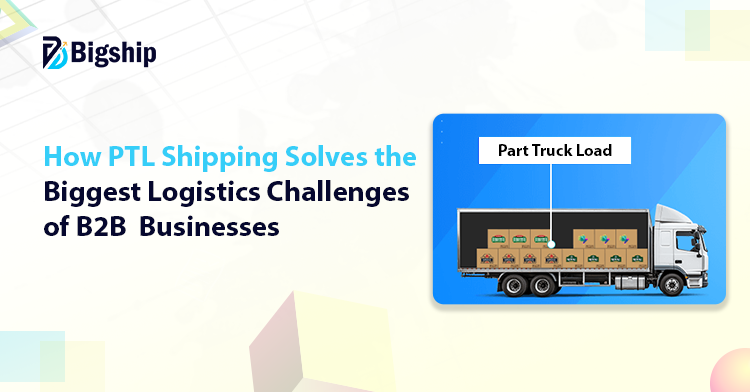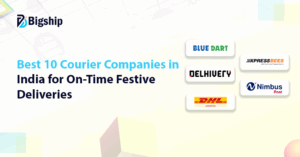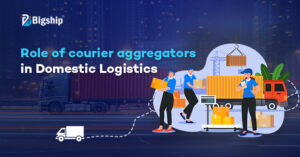In every B2B logistics shipment, it matters whether a truck is full or partially loaded in terms of loading weight. Partial loads often incur additional costs, cause delays, and do not rank high on the carriers’ priority lists. Booking an FTL for a partial load makes it even more expensive, slowing down supply chains and directly affecting customer satisfaction.

Thus, PTL logistics enters the scene, giving businesses the option of sharing truck space while being charged only for that portion of space that is occupied. It is cheaper and smarter to do so, as against an entire truckload.
This blog explains how PTL shipping solves common challenges B2B companies face when sending small to medium shipments.
What is Part Truck Load Shipping?
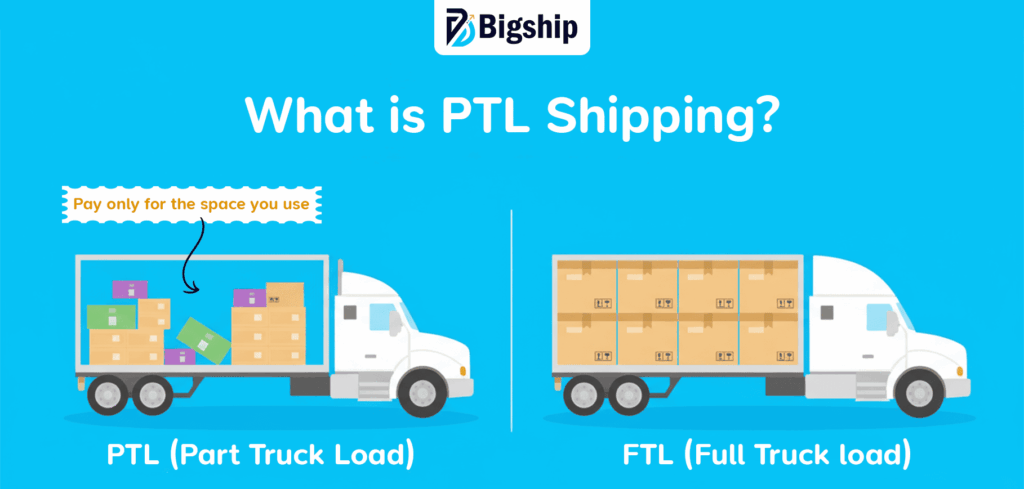
PTL (Part Truck Load) shipping, also called partial truckload shipping, is a shipping method used when not enough items are to fill an entire truck. You pay to share the space of a container with some other company’s goods, instead of hiring a complete truck, which can be costly.
Here is how it stands in comparison with other options:
- FTL (Full Truck Load): As a shipper, you hire a complete truck, even though it may only be half-filled. Best for very large shipments; however, costly when you do not utilize all the space.
- LTL (Less-than-Truckload): Multiple small shipments are consolidated, but often through many stops and hubs, delaying the delivery.
- PTL (Part Truckload): Your goods share truck space with a few shipments as compared to LTL, so faster and cheaper than FTL and more reliable than traditional LTL.
This is best for Businesses shipping moderate loads, for example, around 50 kg to a few tons that do not require a full truck.
Why Low-volume Shipments Struggle Without PTL?
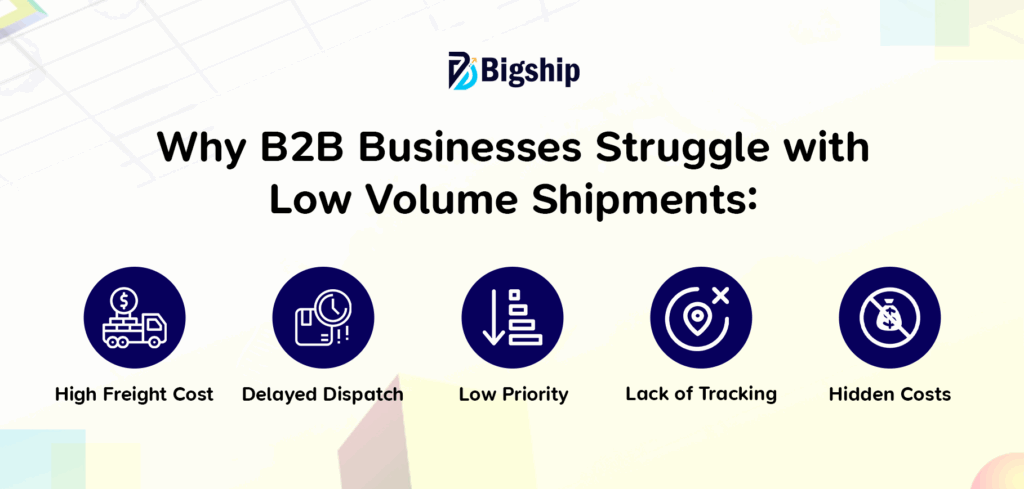
If your business ships goods in small or medium volumes, traditional shipping methods often are more of a problem than a solution. Here is how:
1. High Freight Rates: Full truckload freight bookings require payment irrespective of whether one shipper fills the entire truck or not. For SMEs or developing B2B companies, this means paying increased logistics costs for no value at all.
2. Delay in Dispatch: In most cases, transporters stall truck movements until they are fully loaded. This means your goods stay at the warehouse for more days, in limitation to being added to more shipments, regardless of your delivery schedules.
3. Lack of visibility and tracking: For fragmented logistics markets, partial freight gets lost in the system. Without proper tracking and real-time updates, you may not know where exactly your shipment is or when it will arrive.
4. Unreliable Timelines: When deliveries are delayed, business usually faces missed deadlines, unhappy buyers, and lost deals in some cases. In B2B trade, value is placed on being on time, and delayed shipments can cost dearly in terms of relationships.
PTL vs Future Shipping Method: Where Does One Fit Relative to the Other?
Shipping could basically be from FTL, Courier/Parcel Services, Traditional Transporters, or PTL. While each serves a purpose, it is PTL that offers the perfect option for somewhat medium-sized shipments.
1. PTL vs FTL
FTL means you book the whole truck, no matter if you completely fill it or not. It’s good for large shipments, also it becomes too costly with small payloads. On the other hand, PTL shipping lets you share truck space with other shipments and pay only for the space you actually use. Thus, it is a cheaper option.
2. PTL vs Courier or Parcel Services
Courier/parcel services are best for very small shipments, like e-commerce orders or documents. However, if your load reaches a gross weight of about 200 kg or 1 ton, they cannot scale for your needs. PTL freight is served for exactly these medium loads too big for couriers and too small for full truck loads.
3. PTL vs Old Transporters
Small shipments may face a lot of delays through traditional transporters, maybe without being tracked in real time, and thus may be unreliable, but with PTL shipping, you pay only for the space you use, get on-time deliveries, and enjoy real-time visibility.
Quick Comparison
| Method | Best For | Pros | Cons |
| FTL (Full Truckload) | Very large shipments that fill a truck | Dedicated truck, faster delivery | Very expensive if you don’t use all the space |
| Courier/Parcel | Small packages & eCommerce orders | Easy to book, fast | Not suitable for bulk or heavy shipments |
| Traditional Transporters | General goods movement | Wide availability, flexible options | Often unreliable, limited tracking, and delays |
| PTL (Part Truckload) | Medium loads (50 kg – a few tons) | Cost-effective, flexible, real-time tracking | Not ideal for very small shipments |
Key Benefits of PTL Shipping for B2B Businesses
The following key advantages elevate PTL trucking as the preferred mode of shipping in the B2B context:
1. Affordable Shipping: You pay the PTL supplier for the space occupied by your shipment, not for the entire truck. This is very affordable, particularly for SMEs with medium-sized loads.
2. Faster Turnaround: With the traditional courier, goods are dispatched after days, meaning that the full truck will be ready to be filled. PTL is fast in terms of handling the logistics of goods; hence able to pay for full commitments.
3. Flexible and Scalable: B2B shipping requirements keep changing, sometimes producing a lot and at other times producing very little. PTL logistics accommodates both. All seasonal, inconsistent, or growing companies that never needed to fill a whole truck are eligible.
4. Much Superior Control & Tracking: They provide real-time updates and keep track of your shipments with enough technology to send proactive alerts. Such transparency gives you less uncertainty and helps you with better planning.
Example of Bigship: A pharmaceutical distributor shipping moderate consignments to multiple cities used Bigship PTL freight services and reduced logistics costs by 28% while medicines reached retailers on time. This not only improved margins but also cemented the trust of partners who depend on timely delivery.
How Bigship PTL Shipping Solves Your Low-volume Shipping Problems?
Bigship’s PTL logistic solutions aim to keep the B2B shipping process simple, cheap, and reliable. Here’s how the most frequent inconveniences businesses face with low-volume shipments get resolved:
1. All-India PTL Network: With coverage across all major Indian cities and trade hubs, Bigship ensures your goods move smoothly, no matter where your buyers or distributors are located.
2. B2B-Competitive Rates: Our PTL freight rates have been optimized for SMEs, wholesalers, and manufacturers. You pay only for the truck space you use, budget-friendly and yet reliable.
3. Technology-Enabled Dashboard: Bigship’s finest online platform executes instant quotes, the fastest booking, live tracking, and proactive support on a streamlined platform.
4. Flexible Load Options: Bigship’s PTL shipping can easily handle any shipment, ranging from a 50-kg box to many tons of goods, without requiring you to book an entire truck. This option allows quite a bit of flexibility for businesses with shipments of varying sizes.
5. Dedicated B2B Support Team: You get follow-up support all along the way, from onboarding to issue resolution, to make sure every shipment goes off successfully without any stress.
6. Multi-Carrier Network: Bigship is not locked into one single carrier. It rather connects you with a wide network of PTL trucking partners so you can pick the one that suits your shipment with regard to the price, time, and quality of service.
Getting Started with PTL Shipping on Bigship
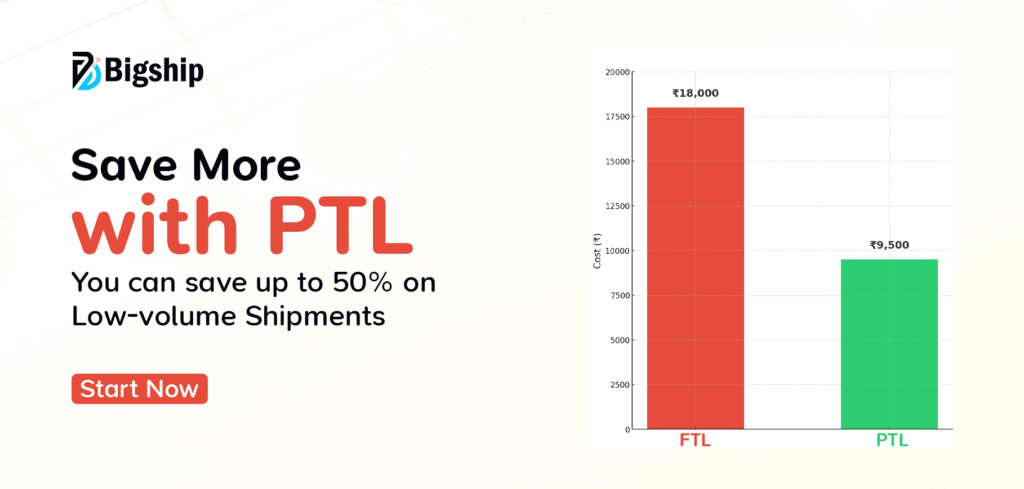
- Step 1: Sign up on Bigship
- Step 2: Complete KYC
- Step 3: Enter shipment details
- Step 4: Book and track seamlessly
Conclusion
Low-volume shipment challenges have long been a concern, with time and costs eroding profit and customer trust. But with PTL shipping, these issues become opportunities. With shared truck space, one can save costs, move goods faster, and get better visibility of the supply chain.
At Bigship, our mission is to help SMEs, wholesalers, and manufacturers scale their business without worrying about logistics. Our PTL trucking network, competitive rates, tech-enabled dashboard, and dedicated B2B support make shipping smarter, simpler, and more profitable.
Sign up with Bigship and let’s start making your low-volume shipments cost-effective and reliable with PTL shipping.
FAQs
What is the minimum load for PTL?
Even ½ KG shipments can be booked under partial truckload freight.
How is PTL pricing calculated?
PTL pricing depends on weight, space used, route, and distance covered, hence calculated on the basis of these factors.
Does PTL include insurance?
Yes, PTL shipments with Bigship come with insurance options.
Can PTL shipments be tracked in real-time?
Yes, Bigship offers end-to-end real-time tracking for PTL truck freight.


